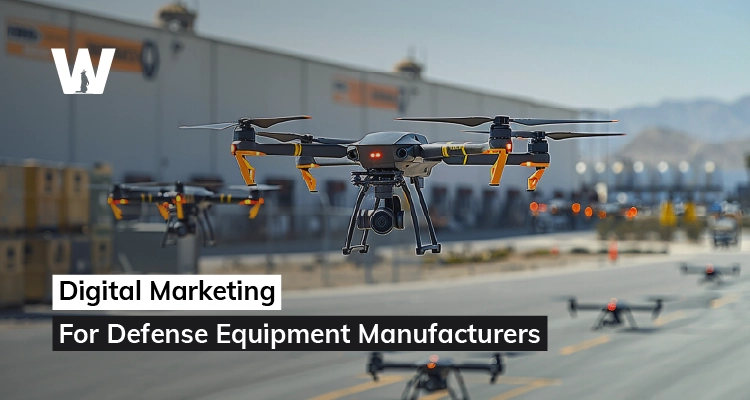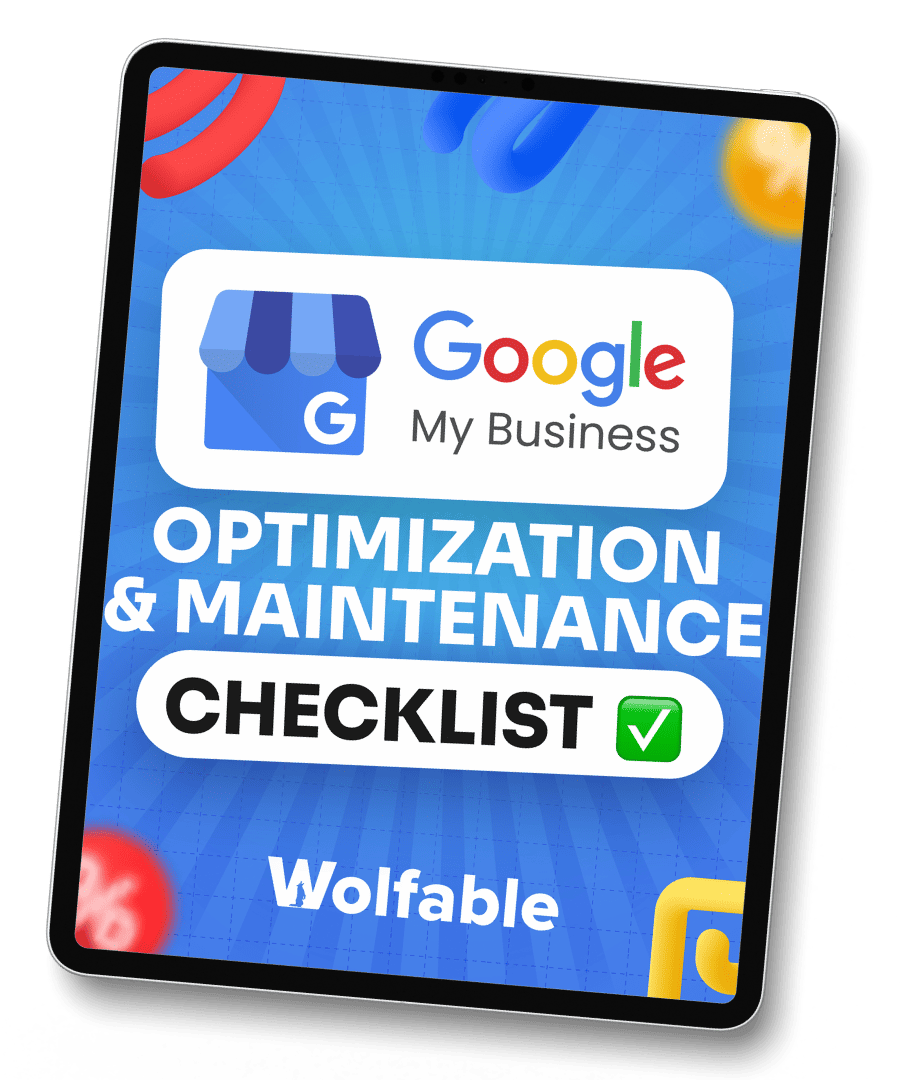Wraps up in 15 Minutes
The world of defense manufacturing has traditionally operated in the shadows, built on handshakes, classified briefs, and exclusive trade shows. Marketing was a matter of reputation and relationships, not clicks and conversions. But the battlefield has changed—and we’re not just talking about geopolitics. The new frontier is digital, and for defense equipment manufacturers, visibility here is no longer optional; it's mission critical.
Many in the industry believe digital marketing is too public, too risky, or simply not relevant for securing multi-million-dollar government contracts. At Wolfable, we see it differently. Digital marketing for defense isn't about running public-facing ads for missile guidance systems. It's a precision tool for building authority, influencing key decision-makers, securing your supply chain, and attracting the next generation of engineering talent.
This guide will demystify how to leverage powerful digital strategies while navigating the industry's unique landscape of security, compliance, and long sales cycles.
Why Can't Defense Companies Rely Solely on Trade Shows Anymore?
The old model of relying exclusively on trade shows and established networks is becoming increasingly outdated. The procurement landscape is evolving, and sticking to traditional methods means leaving significant strategic advantages on the table. A robust digital presence is now essential for long-term growth and resilience.
The decision-makers you need to reach—from procurement officers at the Pentagon to lead engineers at prime contractors like Lockheed Martin or BAE Systems—are using digital channels. They may not be browsing social media for suppliers, but they are using search engines and platforms like LinkedIn to vet potential partners, research new technologies, and verify credentials.
Furthermore, the global talent war is fierce. Top-tier engineers, cybersecurity experts, and material scientists expect to find and engage with potential employers online. A non-existent or outdated digital footprint makes you invisible to the very people you need to innovate and deliver.
How Did a Drone Become a Global Folk Hero?
To understand the power of digital narrative, look no further than the Bayraktar TB2 drone. During the conflict in Ukraine, this piece of hardware transcended its technical specifications to become a global symbol of resistance. This didn't happen by accident; it was the result of a powerful, organic digital marketing phenomenon.
Viral videos shared on platforms like X (formerly Twitter) showcased its effectiveness in real-time. This user-generated content built a narrative of a reliable, game-changing "underdog" technology. The story was so compelling that it inspired a viral folk song. Baykar, the manufacturer, didn't need a massive ad budget; the product's performance, amplified through digital channels, created an unprecedented level of brand recognition and "social proof."
This is the pinnacle of digital marketing in the defense sector: not selling a product, but building an unshakeable narrative of effectiveness, innovation, and reliability that permeates every level of the industry.
What Should a Defense Contractor's Website Achieve?
Your website is not a digital brochure; it's your secure, 24/7 digital embassy. For many potential partners, government agencies, and future employees, it is their first point of official contact. It must be designed with precision, security, and authority in mind.
A successful defense manufacturer's website should:
- Communicate Trust: Feature clear sections on certifications (AS9100, ISO), compliance (ITAR, CMMC), and security protocols.
- Showcase Capabilities: Use high-quality visuals, sanitized case studies, and detailed (but not controlled) technical specification sheets for your products and services.
- Be a Resource Hub: Host white papers, research findings, and articles that establish your company as a thought leader in a specific niche, like advanced composite materials or next-gen avionics.
- Generate Qualified Leads: Implement secure, multi-step contact forms that help pre-qualify inquiries and ensure you're speaking to the right people.
At Wolfable, our Web Design & Development process for industrial clients focuses on creating secure, user-friendly platforms that act as powerful lead-generation engines, tailored to a highly sophisticated B2B audience.
How Can Content Marketing Build Trust with Procurement Officers?
Content marketing is your primary tool for demonstrating expertise and building trust without compromising sensitive information. Procurement officers and technical evaluators are hungry for data that helps them make informed, low-risk decisions. Your content can provide exactly that.
Instead of generic blog posts, focus on high-value, technical content that addresses the specific pain points of your audience. This is where a strategic Content Marketing plan becomes invaluable.
Effective content formats for defense manufacturers include:
- White Papers: In-depth analyses on topics like "The Role of Gallium Nitride in Next-Generation Radar Systems" or "Mitigating Cybersecurity Risks in the Defense Supply Chain."
- Sanitized Case Studies: Showcase how you solved a complex engineering challenge for a client in the aerospace or naval sector, focusing on the process and outcome without revealing classified details.
- Webinars: Host exclusive online events for vetted contacts on topics like CMMC 2.0 compliance or advancements in lightweight armor.
This type of content positions you not as a vendor, but as an indispensable partner in innovation and mission success.
What is Account-Based Marketing (ABM) and why is it Perfect for Defense?
Account-Based Marketing (ABM) is a hyper-focused strategy that treats an individual target company (e.g., a prime contractor or a specific government agency) as its own market. Instead of casting a wide net, you execute a "digital spear-phishing" campaign—a coordinated effort to engage key individuals within that single account.
This approach is tailor-made for the defense industry, where the list of potential customers is often short and clearly defined.
| Traditional Digital Marketing | Account-Based Marketing (ABM) |
|---|---|
| Goal: Generate a high volume of leads. | Goal: Build relationships with specific, high-value accounts. |
| Audience: Broadly defined by industry or persona. | Audience: Named companies and specific job titles within them. |
| Content: General appeal (e.g., "5 Benefits of Our Service"). | Content: Highly personalized (e.g., "How [Our Service] Solves [Target Company's] Stated Q3 Challenge"). |
| Metrics: Cost per lead, website traffic. | Metrics: Account engagement, depth of relationship, deal velocity. |
An ABM campaign might involve running LinkedIn ads visible only to engineers with a "systems integration" title at Northrop Grumman, followed by a personalized email sequence to their department head referencing a recent company announcement. It's the digital equivalent of a targeted, intelligence-led operation.
How Do You Market While Staying ITAR and CMMC Compliant?
This is the single most critical question, and the biggest barrier to entry for most digital marketing agencies. Marketing in the defense space requires a deep understanding of regulations like the International Traffic in Arms Regulations (ITAR) and the Cybersecurity Maturity Model Certification (CMMC).
A compliant digital marketing strategy is built on a foundation of security:
- Control Public Information: Never publish controlled technical data. All content, from blog posts to product specs, must be scrubbed by an export control officer.
- Geofence Your Digital Assets: Restrict access to sensitive areas of your website to specific geographic locations, preventing access from proscribed nations.
- Secure Your Lead Funnel: Use encrypted forms and secure CRM systems. Implement a vetting process for webinar attendees and content downloads.
- Train Your Team: Anyone involved in your marketing efforts must understand the basics of what they can and cannot say online.
Working with a partner who understands this regulatory "minefield" is non-negotiable. It ensures your marketing efforts build your business without creating catastrophic compliance risks.
What Role Will AI Play in Defense Marketing?
Artificial Intelligence is already reshaping the battlefield, and it's set to do the same for the business of defense. For marketing and sales teams, AI is a force multiplier, enabling a level of intelligence and efficiency that was previously impossible.
At Wolfable, we integrate AI & Automation Solutions to help our clients:
- Predictive Lead Scoring: AI algorithms can analyze thousands of data points to identify which leads are most likely to convert into high-value contracts.
- Analyze Government Spending Trends: AI can parse budget documents and contract award notices to predict future procurement priorities, allowing you to align your marketing efforts proactively.
- Automate Supply Chain Communications: Use AI-powered chatbots on secure portals to provide suppliers with instant updates, freeing up your team for more strategic tasks.
Embracing AI isn't about replacing the human element; it's about empowering your team with better intelligence to make smarter, faster decisions.
Transform From a Hidden Asset to an Industry Leader with Wolfable
The era of defense manufacturing thriving in obscurity is over. In a world driven by information, your digital presence is your reputation. It's how you prove your technological superiority, build trust with the next generation of leadership, and attract the brilliant minds needed to secure the future.
Navigating this transition requires a partner that speaks the language of both digital innovation and industrial complexity. At Wolfable, we specialize in crafting sophisticated digital marketing strategies for B2B, healthcare, and industrial sectors—including highly regulated fields like defense. We build digital fortresses that generate leads, establish authority, and protect your brand.
Don't let your innovations remain in the shadows. It's time to take control of your digital narrative.









